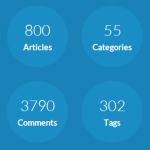Sometimes you don't need statistics. Sometimes you don't need retrospectives. Sometimes you don't need superlatives.
Let’s Undersquiggle Meaning, not Words
Language is a tool, understanding is the goal. It is time we undersquiggle both the dogmatists and the hooligans.
There was a lot of buzz last week about the word “literally”, which is abused by many people who actually don’t mean things literally. Many language dogmatists were outraged, ignoring the fact that the “incorrect” use of “literally” in the English language has literally been around for 200 years.
I literally don’t care.
However, I do care about people incorrectly using the word “blog” when they mean “blog post”. I hate it! As a blogger, it literally makes me weep every time I see this.
Why?
Language evolved for us to communicate with each other. Language is the tool, understanding is the goal. Therefore, whenever people abuse the English language, the question is not, “Don’t they understand that they are incorrect?” The better question is, “Is their incorrectness improving our understanding?”
Improved Understanding
New words and expressions such as breadcrumbing, cyberslacking, and overparenting are all “incorrect” because most dictionaries don’t recognize them. Yet. (My text editor is undersquiggling them right now!) But these unofficial incorrect words and phrases improve our understanding.
This is why we want our language to live and evolve. Tomorrow we can explain things to each other that we couldn’t explain yesterday. It helps us all to be on the same page. (I don’t like that last one, but we don’t have to like each enrichment of the English language.)
Decreased Understanding
On the other hand, people who write “I wrote a blog today” do not improve our understanding. They make things worse! A blog is a simple website (or part of it) with a steady stream of new articles. A blog post is exactly one of those articles. At least, that’s how it was, until the illiterate started blogging.
Nowadays, when someone writes “How do you like my blog?” I have no frickin’ idea what they mean. Do they mean, “Do you like my website?” Or “Do you like my latest post?” Text editors cannot undersquiggle the errors, and most of them are flung on the web unchecked. My only clue is the author’s intelligence, because language itself has lost its meaning. The hooligans have ruined it.
Fashionistas
Literally somewhere in the middle we find the type of language abuse that has no other consequences than the sight of a hundred language dogmatists chased up the tallest tree. When this leaves the less dogmatically inclined among us to literally piss themselves laughing, nobody expects these spectators to actually wet their pants. Understanding is neither improved nor decreased with this kind of “incorrect” language.
In cases like these, it’s merely a matter of taste. The only thing people should concern themselves with, both authors and reviewers, is their personal brand. Pink socks under an orange skirt can be a naïve mistake, or a fashion statement. Comments about the socks can make you a fashionista, or a condescending prick. It’s all up to you. And frankly, I don’t care.
Treat language in a similar way. Language is a tool. Understanding is the goal. We should undersquiggle meaning, not words.
Also see: Improved MLA Style Guide: Delighting the Reader
p.s. I’m hoping to introduce undersquiggle and undersquiggling in the English language. At the time of writing they only have 423 and 81 search results respectively on Google. Let’s undersquiggle the dogmatists and the hooligans. I’m sure you know what I mean.








